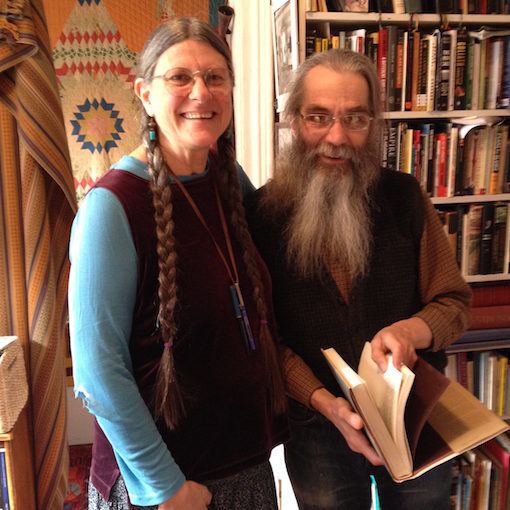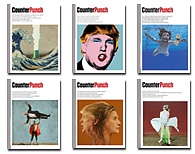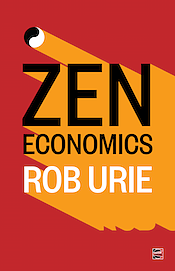
Before making their home in Damascus, Gabe Huck and Theresa Kubasak had regularly visited Baghdad and other Iraqi cities, where they developed lasting friendships and deepened cultural awareness. Iraq was steadily deteriorating under thirteen years of U.S./UN imposed economic sanctions. Despite iron clad determination by U.S. policy makers to isolate Iraq, Gabe and Theresa repeatedly challenged the economic sanctions by carrying medicines and medical relief supplies to Iraqi children, families and hospitals.
They also helped organize opportunities for scores of other U.S. and U.K. people to visit Iraq as part of Voices in the Wilderness (VitW). Voices delegations politely but firmly notified U.S. authorities that they would break the economic sanctions by personally carrying duffel bags filled with children’s vitamins, antibiotics, medical textbooks, surgical kits, first aid material and medical relief supplies, all of which the economic sanctions prohibited. Evidence for prosecution of one delegation included a bottle of water and a blank video that had been purchased in Baghdad.
Punishment ostensibly imposed to force the Iraqi government’s compliance with weapons inspectors had directly contributed towards the deaths of hundreds of thousands of children under age five. The VitW campaign succeeded in sending 70 delegations to Iraq, all of which prompted greatly needed education and public discussion in cities and towns across the U.S. and the U.K. Leslie Stahl posed the question in a Sixty Minutes segment that aired in May of 1996: were the deaths of over one half million children under age five an acceptable price to pay for a dubious policy? “Yes, Leslie,” said Madeline Albright, who was the U.S. Secretary of State. “I’m a humanitarian person, and it’s a difficult choice to make, but the price, we think the price is worth it.”
Gabe and Theresa begged to differ.
Voices in the Wilderness (VitW) was based in a second floor apartment on Chicago’s north side, a few miles south of Gabe’s and Theresa’s home in Evanston. Eyes lit up inside “the office” whenever Gabe and Theresa came up the stairs. Along with their encouragement and wisdom, they would always bring fresh baked pastries or a loaf of bread. About a dozen young people had poured energy and determination into strengthening VitW efforts to defy the sanctions against Iraq. They in turn drew immense inspiration and guidance from Gabe and Theresa.
“I think I understand,” a young nurse from the U.K. murmured, as he sat at the bedside of a dying child in the pediatric ward of a major hospital in Baghdad. “It’s a death row for infants, isn’t it?” A death row for infants. Travelers to Iraq encountered brutal, lethal punishment of children. Every hospital visit was nothing less than shocking. By the time the U.S. military had geared up for the 2003 Shock and Awe campaign, Iraqis had already been pummeled, starved, humiliated and bereaved. “You come and you say, you will do, you will do,” said one Iraqi teenager, addressing a delegation of U.S. people visiting her high school class. “But nothing changes. Me, I am sixteen. Can you tell me, what is the difference between me and someone who is sixteen in your country? I’ll tell you. Our emotions are frozen. We cannot feel!” She sat down, suddenly overcome by feelings of anguish.
Many people worldwide may have been tempted, through mainstream media coverage, to think that only one person lived in Iraq, Saddam Hussein. Voices delegation members cultivated a passion to tell people about what they had seen and heard while visiting Baghdad, Basra, Mosul and other Iraqi cities. Gabe and Theresa exemplified a beautiful ability to explore history, culture, complexity, diversity and nuance, wherever they traveled. To this day, they maintain close friendships with people they first met during their visits to Baghdad. Always, their concern for children occupied the forefront of their distress and commitment.
Their research and study, along with their good humor, helped all of us gain needed maturity as we tried to campaign for ending the hideous economic war and prevent a new round of bombing and invasion.
Having watched them in action through many years of Voices witness and work, I wasn’t surprised by their readiness to become rooted in Damascus, intent on finding ways for ordinary U.S. people to begin reparations to Iraqis whose lives have been forever altered and traumatized by successive U.S. military and economic wars. But I often feel mesmerized by their seemingly endless capacity to learn, grow and serve. I remember visiting them in Damascus when they were learning Arabic. Utterly diligent in their studies, they knew they must give immovable priority to daily lessons.
Yet they also managed to invite young people to study with them, sharing with others their remarkable tutor, Mazen. Young people who went to study Arabic in Damascus could count on Gabe and Theresa for help with housing and orientation. What’s more, they would be treated to enlivening trips and boundless encouragement.
Eventually, these two efficient and hospitable teachers began to imagine practical, sustainable ways to help Iraqi youngsters, displaced by war, continue their studies. In September, 2016, a UNHCR report “highlighting education as an overlooked casualty of the global refugee crisis,” (NYT, 9/15/2016) noted that:
Nearly two-thirds of the six million school-age children classified as refugees have no school to attend…Roughly 1.75 million refugee children are not enrolled in primary school and 1.95 million refugee adolescents are not in secondary school, the refugee agency report said.
“It is essential that we think beyond basic survival,” said Filippo Grandi, the United Nations high commissioner for refugees.
Gabe and Theresa had identified one of the most grievous results of war and displacement. A new generation becomes undereducated, less able to care for their families and meet basic needs.
Ever appreciative of challenges and confident in their exceptional capacity to team up, they explored the many strands needed to develop potential for Iraqi youngsters to attend Universities in the U.S. The Iraq Student Project became a growing tapestry.
For Gabe and Theresa, and eventually a stalwart group of supporters who sometimes participated in springtime visits to Syria, Damascus was an idyllic setting in which to pursue a project that put them in touch with resilient and fascinating young people. Never Can I Write of Damascus…celebrates a plethora of sights, sounds, aromas, delicacies and intricacies of the city as experienced over the seven years when Gabe and Theresa resided there. But the Iraqi Student Project also connected them to a staggering array of bureaucratic requirements. With numerous forms to fill out and interviews to face, they doggedly pursued University admission and a U.S. student visa for each student who entered the U.S.
I marveled at their indefatigable, constant attentiveness to so much detail. They look back on those rigors with good humor and a gentle irony. Characteristically, they turn adverse experiences into a means for deepening needed empathy. Gabe recently suggested that I read a novel, The Corpse Washer, by Sinan Antoon. (It’s one of several books discussed in an annotated bibliography at the end of their book). Antoon writes with heart-wrenching sensitivity about how difficult it becomes to cross a divisive border following a war:
(p. 149) “I felt as if we had been struck by an earthquake which had changed everything. For decades to come we would be groping our way around in the rubble it left behind. In the past, there were streams between Sunnis and Shi’ites, or this group and that, which could be easily crossed or were invisible at times. Now, after the earthquake, the earth had all these fissures and the streams had become rivers. The rivers became torrents filled with blood, and whoever tried to cross drowned. The images of those on the other side of the river had been inflated and disfigured…concrete walls rose to seal the tragedy.”
Pope Francis exhorts listeners to overcome the fears that drive people to seal themselves off from others. With the walls come weapons and the weapons lead to war. “Why,” Pope Francis asked, when addressing the U.S. Congress in 2015, “would anyone give weapons to people who use them for war?” The answer, he said, was simple. “The answer is money, and the money is drenched in blood.”
Weapons and bloodshed have wreaked new chaos and havoc, destroying the lives and homes of people throughout Syria and beyond. Gabe and Theresa left Damascus in 2012. Since that time, thousands more have been displaced. The UN estimated in April 2016 that at least 400,000 Syrians have been killed. The rivers have become torrents of blood.
When I last visited with Gabe and Theresa, they shook their heads in silent sorrow, contemplating the ruinous debacle of endless war. Nevertheless, they and their friend Mazen have discovered ways, in Istanbul, to assist young refugees seeking continued education. When walls arise that would seem to seal the tragedy of war in concrete boundaries, Gabe and Therese find ways to cross the borders. Never Can I Write of Damascus invites us to do the same.
(A version of this article first appeared in the National Catholic Reporter, Feb. 8, 2017.)











